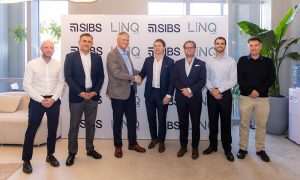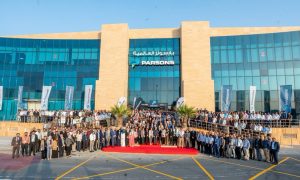Keeping up with the Genset
Powered by the rental sector the generator sector has found its niche plugging in the gaps of the region’s energy needs.

Powered by the rental sector the generator sector has found its niche plugging in the gaps of the region’s energy needs.
Keeping up with the Genset has become increasingly difficult in the Middle East with the sector experiencing a burst of energy driven by the construction industry and the region’s inability to plug the gaps in its electricity grids. If that sounds like a mouthful just you wait to you see the number of options that are now available through distributors and rental houses.
The recent Middle East Power and Electricity event saw a number of high profile companies either entering the market or stepping up their presence.
Looking to bunny hop on the event, Navistar, the US truck maker and genset manufacturer, launched its International MaxxForce engines into the Middle East.
The truck and diesel engine manufacturer’s roots go back 180 years (40 years in Gensets) and while it is ranked 204 in the US’ fortune 500 companies it has been previously happy to keep a relatively low profile in the market. However it wants to expand its operation across the Middle East.
The MaxxForce line of fuel-efficient, reliabile and durable engines includes a wide range of gen-set models that offer 3, 4, and 6 cylinder diesels rated from 31 kVA up to 220 kVA standby power at 50 Hz. and from 40 kVA up to 260 kVA at 60 Hz. Some dedicated Cummins users have noted that the engines do not compare favourably with the similarly powered Cummins B engines (MaxxForce is larger and has a different wet sleeve design), and different emissions control systems) in terms of future maintenance costs, but on paper the twin turbo unit looks suited to the region.
“We are committed to the Middle East market and we are confident in our growth opportunities in the region,” said Dave LaPalomento, general manager of Navistar Global Engine. “We are making investments in the people, products and communities in which we operate because we see the Middle East region as a strategic growth area for Navistar for the long-term.”
With MaxxForce warmly received, the company has been rolling it out in North America, South America, Asia, and distribution points worldwide.
“Navistar Engine Group has the capability to provide the most strategic and innovative technology solutions to customers, no matter where they are,” said LaPalomento. “Our manufacturing expertise is renowned worldwide. We build MaxxForce brand engines serving a vast array of customers for on and off-highway applications across the globe.”
He added: “Backup power needs of business, developing countries and communities confronted with natural disasters require reliability and capability. That is what MaxxForce engines provide for the stationary power industry. We refuse to sit still in our pursuit of the ultimate power source for stationary power manufacturers. MaxxForce engines and the application engineers behind those products will generate a new experience for you and your customers.”
While Navistar’s story in the Middle East is only beginning to take shape, Atlas Copco has been heavily involved for 40 years and selling gensets for 25 years. It has chosen to focus on durability and ruggedness with its ultra tough HardHat design QAX range of portable generators.
With a canopy constructed of linear medium density polyethelene (LMDP), the QAX30 30kVA portable generator is designed to withstand the harshest of conditions and treatment.
“Inevitably generators are bumped and scratched to various levels that make the machine look old and unattractive,” said, regional business line manager, Atlas Copco Middle East, Michael Sagermann.
Atlas Copco is lauding the QAX20 for its durability and it claims it has boosted the lifespan adding years to its expected usefulness in comparison with average portable generators. The benefit, it says, means units will hold their original price tag for resale versus conventional steel.
Sagermann added that the ultra durable HardHat design increases the life and resale value of the portable generator, at the same time saving users on operational costs.
“Inevitably generators are bumped and scratched to various levels that make the machine look old and unattractive,” said Sagermann, who added that the lifespan of the QAX20 lasts years longer than normal portable generators, while holding an increased amount of its original price tag for resale versus conventional steel.
“The LMDP is structurally strong, does not scratch or dent thereby keeping it looking very new and upon reaching the point of time for replacement increases its resale value on the second hand market.”
In addition to the QAX30, Atlas Copco also showcased the QLTH40 lighting tower and the QAC1000 containerised generator for the first time at Middle East Electricity.
“We have been producing generators for 25 years, and many customers from our successful compressor business were not aware we could offer generators and lighting sets as well,” commented Sagermann.
Meanwhile, Perkins is launching a brand new range of diesel engines for the electric power market, filling the gap between the company’s current 1300 and 2000 Series ranges.
The family comprises a range of full authority electronic control, turbocharged, air-to-air charge-cooled engines that have been developed to provide prime and standby power in a clean and cost-effective fashion with special emphasis placed on improved power density, reliability and robustness.
The six cylinder1600 Series ElectropaK, 9.3 litre range offers outputs up to 300kVA (240 kWe) prime power and 330 kVA (264 kWe) standby power at 1500 rpm – both key nodes – though the intention is to release a 350kVA (280kWe) standby version later in the year.
Engines with ElectropaK specification are supplied fully fitted with suitable radiators, charge coolers, air cleaners, pipes, hoses and mounting feet so providing a fully engineered turnkey package that can be integrated directly with generating sets.
For OEMs and genset packagers the key benefits include the combination of higher power density and load acceptance, which effectively means that the 1600 Series can achieve outputs normally associated with much bigger displacement engines, while offering a space saving opportunity during installation.
The tropical radiator, which is fitted as standard, ensures that there is high ambient clearance at even the highest temperatures, making it suitable for applications such as supersound canopies.
With little or no derate the unit can produce its maximum output virtually anywhere in the world. Its global acceptability has also been enhanced through the simultaneous launch of versions for both non-regulated and EU IIIa territories.
This versatility has been further increased with the inclusion of switchable models which both reduces parts inventory and supports the needs of the rental market.
Built for durable and economic use, its operating and maintenance costs are reduced thanks to its frugal consumption of fuel – around 200g/kWhr – while whole life costs are enhanced by the 500 hours service intervals and Perkins standard warranty.
The drop in capital expenditure seen in the construction equipment supply presented an opportunity for those willing and able to push products through rental. Consequently establish players in the rental field such as Byrne, Nixon and Aggreko have all the made moves to grab share, but the OEMs themselves have also seen a boost to their performance in the channel. The market is now moving on, with local power companies looking to expand their partnerships into new territories.
Abu Dhabi-based private equity firm Gulf Capital recently bought an 82.7% stake in UAE generation company Sakr Energy Solutions FZCO with the intention to take its range of Lister Petter, Cummins, Mitsubishi, MBH and GE kits into Africa and the near-East. Sakr Energy’s history is a short one forming when its current management split from the assets of GE Energy Rentals.
“This is a young and growing company in a fast-growing sector”Gulf Capital’s CEO Dr Karim El Solh proclaimed.
Sakr Energy operates not only in the United Arab Emirates, but also Saudi Arabia, Qatar, Yemen, Oman and Tanzania. Along with the rental equipment business it also provides turnkey power generation solutions. Gulf Capital will now look to raise between $30-50 million from loans to expand in other countries in Africa and Southeast Asia.The global deficit in power generation increased to 150,000MW in 2010 from 50,000MW in 2004 and is expected to rise to 600,000MW by 2015, according to the Gulf Capital statement.

























